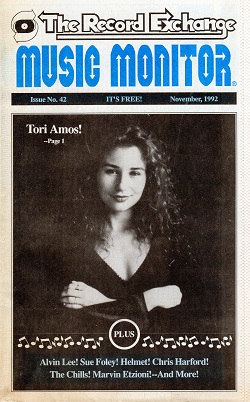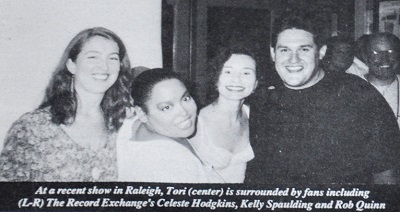|

songs | interviews | photos | tours | boots | press releases | timeline
Music Monitor (US)
(published and distributed by NC music store The Record Exchange)
November 1992

Tori! Tori! Tori!
A North Carolina Native Draws Comparisons to Kate Bush As She Stages Her Own British Invasion!
by Frank Johnson, Raleigh
"Unfortunately, I didn't give my virginity to Robert Plant. But he didn't approach me."
All I did was ask Tori Amos about the cover of Zeppelin's "Thank You" in her Crucify EP and "Whole Lotta Love," which is the veritable showstopper of her live solo performances. After a club date in Raleigh, she also talked about performing in smaller venues.
"A live audience is very private; there's no one else in the world except us. Singing to a televition audience is different, not real. You're very self-conscious of three or four cameras swinging around and the millions of people at home." The big difference, she says, is that, "even in a TV studio, the audience is hundreds of yards away."
Tori Amos has been on the tube a lot lately, doing the talk shows and getting video play to promote Little Earthquakes, "the first record of me doing what I really do." There was an earlier release, Y Kant Tori Read, which was a band album, "not really about me at the piano. It wasn't all my songs, but a collaborative effort with a lot of people. It was a very painful time."
On Little Earthquakes, Tori mentions North Carolina, where she was born. She remembers specific things about spending time in Newton, in Western N.C.: "Junebugs, living with my grandparents, noontime air raid sirens, homemade butter and sneaking into the movies to see Love Story with my sister when I was seven and going, 'Good God, this is fantastic!'"
Now living in England, Tori found the music scene there very supportive. "I had to leave the U.S. for people to be open to what I was going, then come back to this country after England had given the nod. That's how it works sometimes. The U.S. is so big that you can get lost very easily, very fast, and your record is history."
In England, she started out on her own as a front act playing in small rooms to non-existent crowds. "The bands that I opened for felt sorry for me, so they would come out and sit while I played before they came on. And then they'd have their friends come to see me because it was just too embarrassing. They, in turn, would tell people who would tell other people. Within two months, the room started to fill up. My label invited the press to come down at a certain point and they started to write about it.
"I put out an EP called 'Me and a Gun,' which got a lot of attention. One reason was the subject matter, also the single 'Silent All These Years,' which got a lot of airplay in England. That set up the Little Earthquakes album so that people were ready to hear."
Those recordings brought her to the attention of the British public via the media. Many critics were taken by her occasional clashing of opposites. "I've always loved combining brutality and beauty, my favorite things to bring together. When you combine these things, you're tapping into territories we're afraid to walk in. It's like crossing a pond on lilypads, and you go from one to another, jumping back and forth. That's what I do when I write sometimes -- I rip boundaries to pieces; I can't be afraid to cross them. For instance, I love giggling at things most people wouldn't giggle at because laughing at something is to stop being afraid of it. That's how I look at stuff."
"You have to tap into the memory banks that we shut off. We're rather afraid to go in there because if we do, our lives will be different. We'll then have to take responsibility for our choices. So it's easier to walk around numb and not remember that we did have a choice. I try to tap into those memory banks that bring back many, many things that even I can't put into words."
With her success has come comparisons to another talented female singer. "I've heard a lot that I sound like Kate Bush. I think she's wonderful. When you put us up together, there are a lot of differences. There are moments in certain registers when it just comes out a certain way. Sometimes that comes down to anatomy. But I can't sing like Aretha Franklin if my life depended on it. Physically, for whatever reason, my voice has a certain tonality that might remind you of Kate. The similarity ends there because we do many different things also."
And lastly, on the way she sits at the piano, her body squarely addressing the audience, the keyboard at an uncomfortable looking angle to her left: "I've been doing it so long, for years and years. I would do it the opposite way just to balance it out sometimes, but I haven't been able to do that while I'm in performance mode -- I always perform to my right. It feels really good, like every muscle is involved and I'm not detached from the music. Once you get used to doing it, it feels natural."
And that led to the quistion about Zeppelin tunes and a great opening quote. Someday I'll have to ask Robert Plant if he's a Tori Amos fan.

t o r i p h o r i a
tori amos digital archive
yessaid.com
|